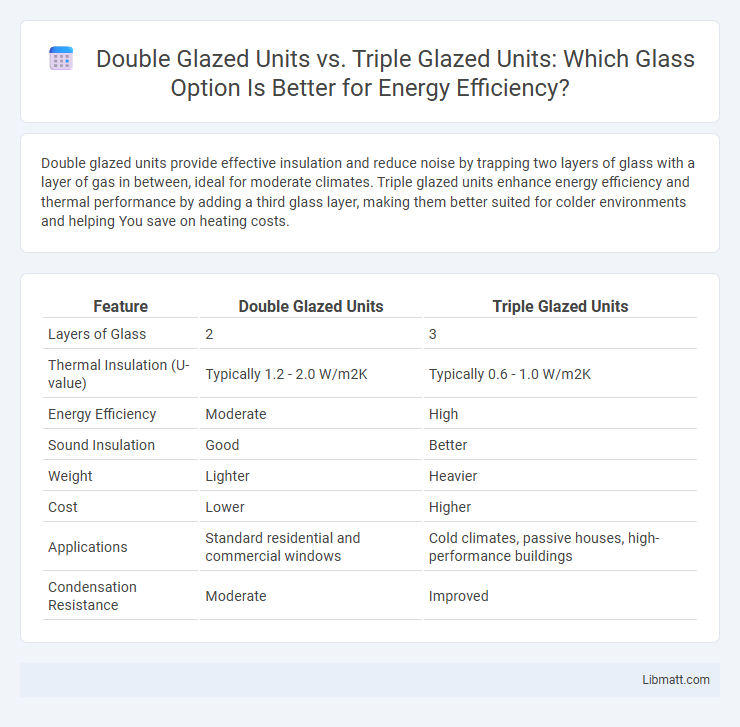Double glazed units provide effective insulation and reduce noise by trapping two layers of glass with a layer of gas in between, ideal for moderate climates. Triple glazed units enhance energy efficiency and thermal performance by adding a third glass layer, making them better suited for colder environments and helping You save on heating costs.
Table of Comparison
| Feature | Double Glazed Units | Triple Glazed Units |
|---|---|---|
| Layers of Glass | 2 | 3 |
| Thermal Insulation (U-value) | Typically 1.2 - 2.0 W/m2K | Typically 0.6 - 1.0 W/m2K |
| Energy Efficiency | Moderate | High |
| Sound Insulation | Good | Better |
| Weight | Lighter | Heavier |
| Cost | Lower | Higher |
| Applications | Standard residential and commercial windows | Cold climates, passive houses, high-performance buildings |
| Condensation Resistance | Moderate | Improved |
Introduction to Double vs Triple Glazed Units
Double glazed units consist of two layers of glass separated by an air or gas-filled space, providing effective insulation and reducing heat loss compared to single glazing. Triple glazed units feature three layers of glass with two insulating spaces, offering superior thermal performance and enhanced soundproofing. Your choice between double and triple glazed units impacts energy efficiency and comfort, with triple glazing generally delivering better insulation in colder climates.
Understanding the Structure: Double and Triple Glazing
Double glazed units consist of two glass panes separated by a spacer filled with air or inert gas, providing effective insulation against heat loss and noise. Triple glazed units add a third pane and an additional gas-filled cavity, enhancing thermal performance and soundproofing significantly. Your choice between double and triple glazing depends on factors like climate, energy efficiency goals, and budget, with triple glazing offering superior insulation benefits.
Thermal Performance Comparison
Triple glazed units provide superior thermal insulation compared to double glazed units due to the extra layer of glass and additional air or gas-filled cavity, significantly reducing heat transfer and improving energy efficiency. The U-value of triple glazed windows is typically lower, averaging around 0.6-0.8 W/m2K, versus 1.1-1.4 W/m2K for double glazed units, indicating better thermal performance. This enhanced insulation minimizes heat loss in winter and heat gain in summer, leading to lower energy bills and increased indoor comfort.
Energy Efficiency and Cost Savings
Triple glazed units offer superior energy efficiency compared to double glazed units by providing better insulation and reducing heat loss through an additional glass pane and insulating gas layer. This enhanced thermal performance results in significant cost savings on heating and cooling bills over time, especially in colder climates where maintaining indoor temperature is challenging. Although triple glazed units have a higher initial installation cost, the long-term energy savings and improved comfort typically offset the upfront investment.
Noise Reduction Capabilities
Triple glazed units provide superior noise reduction capabilities compared to double glazed units due to the extra pane of glass and additional air gap, which enhance sound insulation. These units are particularly effective in minimizing external noise, making them ideal for homes near busy roads or noisy environments. Your choice between double and triple glazing should consider noise reduction needs alongside energy efficiency and budget.
Durability and Longevity Differences
Double glazed units offer substantial durability with two panes of glass and a sealed air gap that resists moisture and temperature fluctuations, ensuring a long lifespan of around 20 years. Triple glazed units enhance this durability with an extra pane and additional sealing layers, providing superior resistance to condensation, increased structural strength, and longevity potentially exceeding 30 years. Your investment in triple glazing typically results in longer-lasting performance and reduced maintenance compared to double glazed options.
Condensation and Moisture Control
Triple glazed units offer superior condensation and moisture control compared to double glazed units due to their additional pane and enhanced insulating properties, which significantly reduce the internal temperature difference causing condensation. Double glazed units may still experience moisture buildup in colder climates or poorly ventilated areas, leading to potential mold growth and damage. Choosing triple glazing can improve your home's indoor air quality by minimizing condensation-related issues and maintaining a drier environment.
Environmental Impact and Sustainability
Double glazed units reduce energy consumption by providing effective insulation, which lowers heating and cooling demands, thus decreasing carbon emissions. Triple glazed units offer superior thermal performance, further minimizing environmental impact through enhanced energy efficiency and reduced greenhouse gas output. The production of triple glazing uses more materials and energy, but its long-term sustainability benefits outweigh these initial costs by promoting significant energy savings over the building's lifespan.
Installation Considerations and Challenges
Double glazed units typically offer easier installation due to their lighter weight and standardized sizing, reducing labor time and costs. Triple glazed units, while providing superior insulation, present challenges such as increased weight requiring sturdier frames and potentially more complex fitting procedures to ensure proper sealing and performance. Your choice should balance enhanced energy efficiency benefits with the installation complexity and structural requirements of triple glazing.
Choosing the Right Option for Your Property
Double glazed units offer effective thermal insulation and cost efficiency, making them ideal for moderate climates and budget-conscious homeowners. Triple glazed units provide superior energy performance and noise reduction, suitable for colder regions or properties requiring enhanced comfort and security. Your choice depends on factors like local climate, energy goals, and budget to optimize your property's insulation and efficiency.
Double glazed units vs triple glazed units Infographic

 libmatt.com
libmatt.com